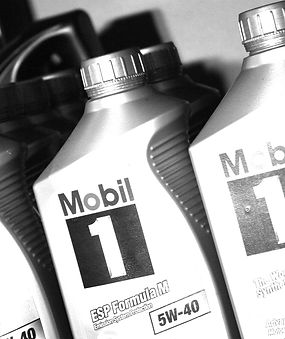
The Right Motor Oil for Your Car -
There are different types of motor oil for all kinds of specific purposes: high-tech engines, new cars, higher-mileage vehicles, heavy-duty and off-road SUVs. You may have to read your owner's manual, to know what the car manufacturer recommends for your vehicle. The types of motor oil include:
Premium Conventional Oil:
This is the standard car oil. The carmakers usually specify a 5W-20 or 5W-30 oil, particularly for lower temperatures, with a 10W-30 oil as optional, particularly for higher temperatures. This covers just about every light-duty vehicle on the road. Changing the oil and filter for conventional oil is scheduled every 4,000 miles or every 4-month interval. The absolute minimum oil change is twice per year. If the car has an electronic oil-change indicator, it it advised not to exceed its warning.

Full Synthetic Oil:
This oil is made for high-tech engines, like in a Chevy Corvette or a Mercedes Benz. It has superior, longer-lasting performance, from viscosity index to protection against deposits. It flows better at low temperatures and maintain peak lubricity at high temperatures. Changing the oil and filter is every 7,500 miles. So, why shouldn't everyone use them? Answer: This oil is expensive and, not every engine needs it. In fact, there may be some features that your car's engine needs that the synthetics don't have. The best advise - follow your owner's manual.
Synthetic Blend Oil:
This has a dose of synthetic oil mixed with organic oil, and overall, formulated to provide protection for heavier loads and high temperatures. It is less volatile, so it evaporates far less, which reduces oil loss (and increases fuel economy). It is popular with drivers of pickups/SUVs who want the high-load protection. And it's a lot less expensive than full synthetics, priced a little more than premium conventional oil.
Higher Mileage Oil:
Today's vehicles last longer, and if you like the idea of running the mileage well into six figures, then this is the right oil choice for your vehicle. Almost two-thirds of the vehicles on the road have more than 75,000 miles on the odometer. When a car or light truck/SUV is older and has more mileage, you may notice a few oil stains on the garage floor. You will need to add a quart more often than when the vehicle was new. The crankshaft seals may have hardened and lost their flexibility, so seals may leak (at low temperatures) and, seals may crack. This oil is formulated with seal conditioners that flow into the pores of the seals to restore their shape and increase their flexibility. In most cases, the seals are designed to swell just enough to stop leaks. You may also notice loss of engine performance and smoothness as a result of engine wear. This oil has the higher viscosity. The result? It seals piston-to-cylinder clearances better, and it won't squeeze out from the engine bearing clearances. Its antiwear additives will therefore slow the wear process. If you have an older vehicle, these features may mean more to you than what you may get from a full synthetic, and at a fraction the price.




